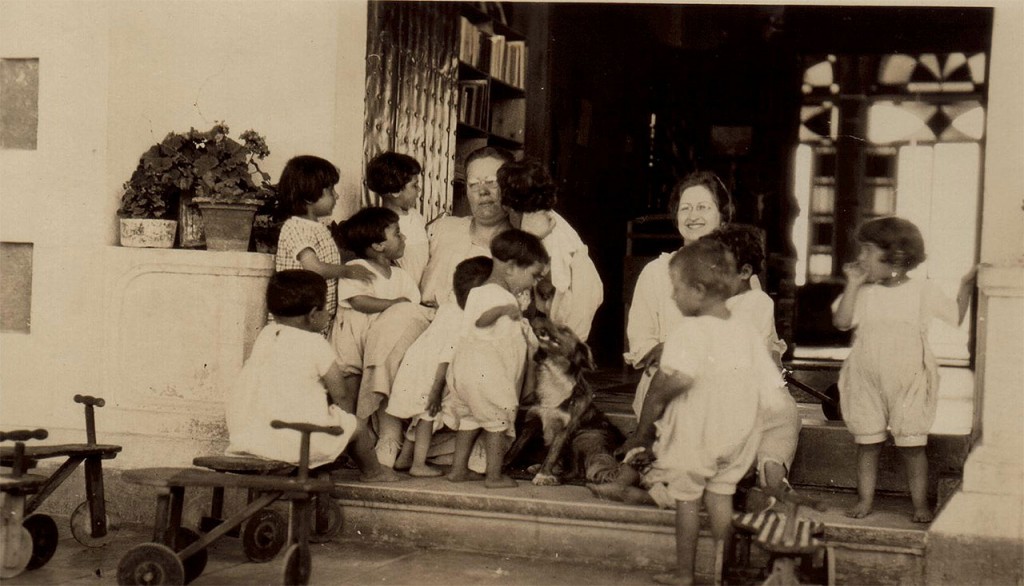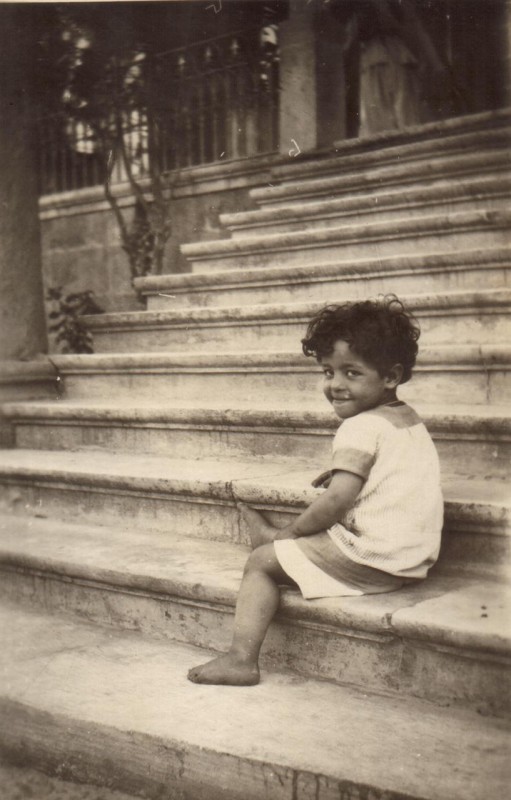Vacation at the Birds’ Nest (Part 3): Nellie’s “Beautiful Dream”
Near East Relief worker Nellie Miller Mann loved to visit the little “birdies” at the Birds’ Nest Orphanage. David W. Mann published his mother’s writings and photographs from her time with Near East Relief in the book Letters From Syria, 1921-1923: A Response to the Armenian Tragedy, Including Stories, Travel and Reports in 2013.
This Dispatch series is excerpted from Nellie’s letters. The text is reproduced with the kind permission of David W. Mann. You can read Part 1 here and Part 2 here.

WEDNESDAY, MAY 23
This is the day for the monthly director’s meeting at Beirut; so Miss Yacobsen set out early in the morning in her REO truck. This morning I felt eager to be out so took a nice stroll in the fresh morning air, up the road past the wheat fields fringed with flowers, very much like bachelor’s buttons. When I returned the babies were having their faces and hands washed at the fountain on the porch, and the nurse was putting the healing touch on all the wounded.
I went out into the garden to write and spent the whole morning among the warm breezes. Several times I was roused from my musing by the monotonous chanting of an arithmetic class out under a spreading tree reciting the tables in concert.
About the middle of the afternoon when the children had finished their afternoon meal and were ready for their usual free play time. On the wide porch, one of the truck drivers drove up in the big G.M.C. with a load of kiddie kars for the babies. They had been made by the Maameltein Industrial boys. With the truck came about fifteen of the Maameltein carpenter boys to help in the erection of the new building for the kindergarten. Most of these boys had relatives and friends among the children of the orphanage and were soon crowded around by happy loved ones.
I started out at a brisk walk down the hill to meet Miss Yacobsen returning from Beirut. The sun had already set and the hill sides were reflecting the radiant afterglow. I had walked about ten minutes before I heard a familiar honk down the Sidon road. They stopped to let me hop on the running board. They brought the exciting news that back along the road they had passed a large truck full of babies coming to the Birdsnest from the Aleppo Orphanage.
Right: A Birds’ Nest staff member with a happy “birdie.”

Birds' Nest children with "kiddie kars" made by older orphans at the Near East Relief Maameltein Industrial School and Orphanage. The boys built the toys as part of their vocational training.
Sure enough, about seven o’clock in drove Abdul in his huge truck bringing thirty-one babies with their mattresses. These babies had been brought from Aleppo in a box car. They were the weakest remnant, who had been too small and sick to come when the blind children and the Greeks were brought down. They were just recuperating from measles and whooping cough. Most of them were full of scabies, many had terrible eyes and heads sore with phavus. Four little babies, scarcely over a year old were so bony, weak and bulgy-eyed, that it made me shiver to look at them. They were too weak to move from the spot where they were placed. All this was bad enough; but added to this was the filth of several days travel and shifting about. It is no wonder that they cried, poor things. They were sent out in the back yard to have some supper, and we went to eat ours. There had been no preparation for the new comers for they had not known of their coming.
According to the oriental custom, they were not dipped into tubs of water; but about six mairiks set to work to scrub the little ones. First of all one of the girls would pour a pan of water over the little one, sitting on a little stone seat, and the mairik would soap and rub the child thoroughly, especially the heads. Rub and scrub, scrub and rub, and the soap ran down into their eyes and ears and mouths that were open screaming. Every few minutes the girl would pour another pan of water. I could not blame them for crying. In fact, I think I would have screamed even louder if past experience had not taught me it was useless to scream. Poor darlings! They had no mothers to love them and cuddle them, hold their slender little bony hands. How did they know what this new home was going to be like?
When they came out of the bath so sweet and clean and were handed to Miss Yacobsen in a large cloth, they stopped their crying, as she held each one close to her and spoke to it a few loving words before passing it over to the woman to dress in some old garments of the other children. She did not know how many had scabies so she put old clothes on all and they were all taken to the segregation tent. Gradually the noisy confusion ceased and the last baby was washed and tucked carefully into bed; and when we went over to see them, most of the children were already fast asleep.

Maria Jacobsen (left) and Nellie Miller (right) with the children and their new toy carts.
When they came out of the bath so sweet and clean and were handed to Miss Yacobsen in a large cloth, they stopped their crying, as she held each one close to her and spoke to it a few loving words...

THURSDAY, MAY 24
Miss Yacobsen presented the kiddie kars to the little ones. They all want to ride at once and cry “Mairik, araba! Mairik, araba!” What a joyful time the children had with the new “arabas.” Then we went over to the scabies tent where Miss Yacobsen gave each child a thorough examination. Some she pronounced as cured and sent them back to the group again. Those who were told to remain, naturally, felt very much to be pitied.
There was one beautiful little boy named Albert who stood outside the tent throwing stones. He was only about three but knew exactly how to hold the stone and throw it like an experienced pitcher. He seemed to be strong and robust and was the most active in the whole group. After his rags were taken off, his curly brown hair cut, and put into a pair of little blue gingham rompers, he was as attractive a child as ever brought joy to an American home.
Last evening when the mairiks found out that this truck load of weak and diseased children was coming to them, they began to lament and fear lest they should bring disease to their other children. But Miss Yacobsen looked at it in another way and cheered them up a great deal by telling them that she was so happy, so happy that these poor little ones had come to their home for mothering; and that they would all have to love them a great deal in order to bring them back to health and happy childhood.
Left: A boy, probably Albert, on the steps at the Birds’ Nest, c. 1923.
Before supper I went into the babies’ room. Most of them were already in their little beds, but when I sat down on the floor beside one of the beds (a mattress and coverlet) they each came running for a hug and a kiss and then I put each one back into her bed and said good night.
And so the days of my vacation passed, as a beautiful dream, all too quickly — the beauty of the home atmosphere, the unfolding of childhood, the mother-love which nurses weak and undesirable ones back to strength and loveliness.
Children lined up in front of the Birds' Nest, c. 1923.
